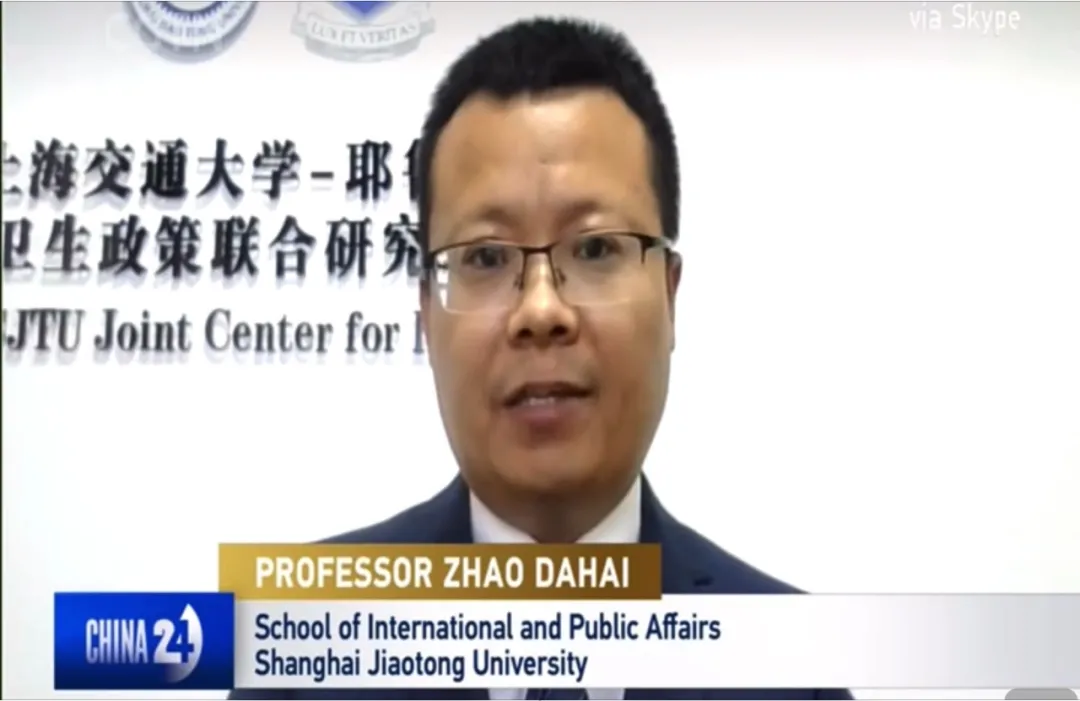上海交大赵大海教授接受央视专访:新冠疫苗对德尔塔毒株依然有效
上海交通大学国际与公共事务学院教授、博士生导师,上海交通大学-耶鲁大学卫生政策联合研究中心执行主任赵大海,自新冠肺炎疫情暴发以来,对于新冠疫情暴发、防控以及卫生政策第59次接受中央电视台专访,也是第98次接受央视、上视专访。2021年7月31日,赵大海接受中央电视台英语频道专访,在《中国24小时》节目,就新冠疫苗对德尔塔毒株的防护效果、公众应对德尔塔毒株的自我防护措施等话题进行了解释。现将访谈内容翻译并摘录如下。

主持人钟石:我们知道,这种新冠的德尔塔变异毒株正在中国各地掀起这一波最新的感染浪潮。它具有高度传染性,我们也知道接种过疫苗的人可能会感染这种新变种。在这种情况下,我们的疫苗目前有多重要?
赵大海:基于目前在中国的研究和观察表明,新冠疫疫苗对德尔塔毒株的新冠病毒的防护能力可能会有一定的下降,但现有疫苗对德尔塔变异体仍有良好的预防和保护作用。此外,新冠疫苗对普通人的有效性至少可以持续一年。鉴于目前的新冠疫苗是属于二级预防,即疫苗的功能是降低从感染到发病的概率。因此,接种过新冠疫苗的人也可能会感染病毒;然而,患病或重病的概率将显著降低。在不久的将来,更多的研究将揭示出新冠疫苗对抗德尔塔变异毒株有效性的确切数据和信息。
主持人:考虑到您刚才告诉我们的,接种疫苗仍然是一个合理的答案,如果我们想保护自己免受德尔塔变异的影响,我的意思是,人们对此感到震惊,他们自己也在采取措施。他们中的很多人都在减少旅行,避免外出旅行,在这次疫情暴发后,他们遵守当地的限制。您认为我们怎样才能更好地保护自己?我们还能共同做些什么?
赵大海:实际上,使得我们公众免受德尔塔毒株感染的防护措施与抗击传统新冠病毒的措施是类似的。首先,所有公众都应该充分重视德尔塔病毒,绝对不可以放松警惕。我认为这是保护公众不感染德尔塔毒株的最重要措施。考虑到在中国大陆过去近一年的时间内,绝大部分地区都没有发生过新冠的再次暴发,大量的公众已放松了对新冠的警惕。其次,对所有人而言,都应严格执行常规的防护措施。具体来说,人们外出时需要佩戴口罩并保持社交距离、尽量不参加集会、必须接种疫苗。毕竟,接种新冠疫苗是保护我们自己的最好办法。
供稿者:国务学院
日期:2021年8月2日
Dahai ZHAO’s Exclusive Interview with CGTN: Vaccines still effective at preventing Coronavirus disease from Delta variant
Dahai Zhao, a doctoral supervisor at the School of International and Public Affairs of Shanghai Jiao Tong University and Executive Director of Shanghai Jiao Tong University-Yale University Joint Research Center for Health Policy, has been interviewed by CGYN for the 59st time (the 98st time by CGTN / ShanghaiTV) since the COVID-19 pandemic. On July 31, Zhao commented on the effectiveness of the Chinese vaccine against the Delta strain and the self-protection measures against Delta strain on “China 24” of CGTN.
Anchor ZHONG Shi: Professor Zhao, welcome to the program. Here's what we know. We know that this variant delta is driving this latest wave of infections across China. It is highly contagious, we also know that people who have been vaccinated can be infected with this new variant. Under that context, professor, how important our vaccines at the moment?
ZHAO: The present research and observations in China have suggested that the protective capacity of the COVID-19 vaccine against delta variant may decline, but the current vaccines still have a good preventive and protective effect on delta variant. Furthermore, vaccinating is still the best way to protect people. Further, considering the current COVID-19 vaccines belong to the secondary prevention, the function of vaccines is to reduce the probability from infection to disease. Therefore, people who have been vaccinated, may have the chance of being infected the virus; however, the probability of being illness or severe illness will be significantly decreased. In addition, more research in the near future will demonstrate the data and information for the exact effectiveness of the COVID-19 vaccines against the delta variant.
Anchor: Professor, given what you just told us, getting vaccinated is still a rational answer, if we want to protect ourselves against the delta variants, I mean, people are alarmed by this way, they are taking measures themselves. A lot of them are cutting travel avoiding travel out of town, um, they are abiding by local restrictions in the aftermath of this outbreak. How do you think we can better protect ourselves? What more can we do collectively?
ZHAO: Actually, the protecting measures for our citizens against delta variant are similar to combating the traditional COVID-19 virus. First, all citizens should pay full attention to the delta variant and not relax the guard. I think this is the most important measure for our citizens. Considering there have been no outbreaks in the past half a year in the most majority areas of Chinese mainland, a large number of people have relaxed the guard. Second, the regular protective measures should be strictly implemented for all people. Specifically, wearing face masks and keeping social distance when people go outside; not to attend gatherings; and must be vaccinated. After all, vaccinating is the best way to protect ourselves.
Contributor: SIPA, SJTU
Date: August 2, 2021

